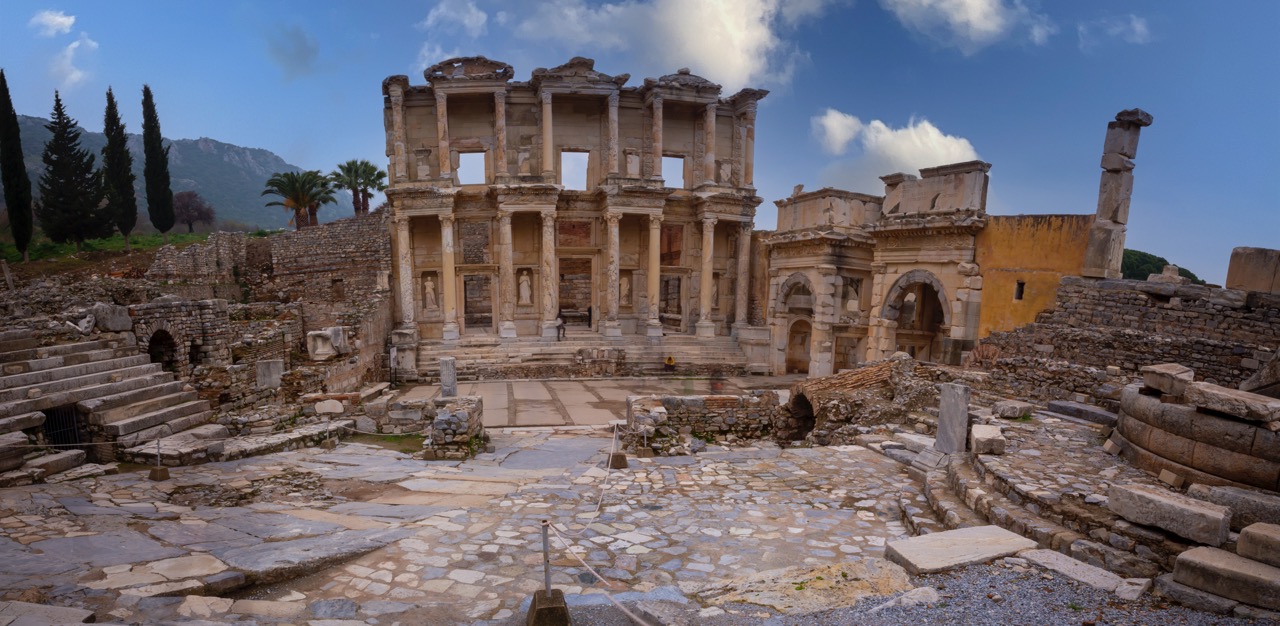Ephesus is one of the most significant cities of the ancient world, known for its rich history, monumental architecture, and its role in early Christianity. Located on the western coast of modern-day Turkey, Ephesus has been home to various civilizations and has witnessed some of the most important events in ancient history. In this post, we’ll take a deep dive into the complete timeline of Ephesus, exploring its founding, rise, and eventual decline.
1. The Founding of Ephesus: The 10th Century BC
Ephesus was founded in the 10th century BC by ancient Greek settlers. According to legend, the city was established by Androclus, a prince from Athens, who led his people to settle on the coast of Asia Minor (modern-day Turkey). Archaeological evidence shows that Ephesus was inhabited as early as the Bronze Age, but the first major settlement is attributed to the Ionian Greeks.
- Founding Date: Around 1000 BC
- Founder: Traditionally attributed to Androclus, an Ionian prince
- Early Inhabitants: Ionian Greeks and local Anatolian peoples
- Early Name: The name Ephesus likely derives from the ancient Greek word Apasa, meaning "city."
2. Ephesus Under the Lydian Kings: 7th–6th Century BC
By the 7th century BC, Ephesus had grown into a prosperous city and came under the control of the Lydian Kingdom, ruled by King Croesus. During this period, the city flourished economically and culturally, becoming an important center for the worship of Artemis, the goddess of hunting and fertility.
- Key Development: The construction of the Temple of Artemis, one of the Seven Wonders of the Ancient World, began during this time.
- King Croesus’ Role: Croesus funded much of the city's development and contributed to the initial construction of the grand temple.
3. Ephesus in the Persian Empire: 6th–4th Century BC
In 547 BC, the city fell under the control of the Persian Empire after the conquest of Lydia by Cyrus the Great. Although Ephesus retained some autonomy, it became a key city in the Persian-controlled region of Ionia.
- Persian Influence: Ephesus remained a major trading center during Persian rule and was allowed to maintain its Greek cultural and religious practices.
- Ionian Revolt: Ephesus played a role in the Ionian Revolt against Persian rule in 499 BC, which ultimately failed, but it marked the beginning of Greek resistance to Persian dominance.
4. Ephesus During the Hellenistic Period: 4th–2nd Century BC
In 334 BC, Alexander the Great liberated Ephesus from Persian control during his conquest of Asia Minor. After Alexander’s death, Ephesus came under the rule of various Hellenistic kingdoms, including the Seleucids and the Ptolemies.
- Hellenistic Growth: Ephesus thrived as part of the Hellenistic world, experiencing a cultural and economic boom.
- Reconstruction of the Temple of Artemis: After the original temple was destroyed by fire in 356 BC, a larger and more magnificent version was built during this period.
5. Ephesus in the Roman Empire: 2nd Century BC–3rd Century AD
Ephesus reached its peak of prosperity under Roman rule. In 129 BC, it became the capital of the Roman province of Asia and one of the most important cities in the empire. The city became a bustling center of trade, culture, and religion.
5.1. Monumental Architecture
Many of the iconic structures that remain today, such as the Library of Celsus, the Great Theatre, and the Terrace Houses, were built during the Roman period.
- Library of Celsus: Built in the 2nd century AD, this iconic library housed thousands of scrolls and stood as a symbol of the city’s intellectual and cultural influence.
- Great Theatre: The massive theatre, which could hold 25,000 spectators, was a central hub for public gatherings, performances, and gladiatorial contests.
5.2. Early Christianity
Ephesus also became a major center for early Christianity. The Apostle Paul preached in the city, and John the Apostle is believed to have lived and written his Gospel here. The Epistle to the Ephesians in the New Testament is addressed to the Christian community in Ephesus.
- Paul’s Ministry: Paul spent three years in Ephesus during his missionary journeys, spreading the Christian faith.
- John the Apostle: Tradition holds that John the Apostle spent his final years in Ephesus and wrote the Book of Revelation nearby.
6. The Decline of Ephesus: 3rd–7th Century AD
Ephesus began to decline in the 3rd century AD, largely due to natural disasters, invasions, and changing trade routes. Several earthquakes struck the region, causing significant damage to the city’s infrastructure.
6.1. Siltation of the Harbor
One of the main reasons for Ephesus’ decline was the silting of its harbor, which cut off its access to the Aegean Sea. As the harbor filled with sediment, the city lost its importance as a major trading center.
6.2. Gothic Invasion
In 262 AD, Ephesus was sacked by the Goths, which further contributed to its decline.
6.3. Byzantine Rule and the Rise of Christianity
During the Byzantine period, Ephesus remained a significant Christian city. The Council of Ephesus, held in 431 AD, was a major event in Christian history, confirming the Virgin Mary as the Mother of God. However, the city never regained its former economic and cultural dominance.
7. The Abandonment of Ephesus: 14th Century
By the 14th century, Ephesus had been largely abandoned. The changing landscape, loss of its harbor, and the rise of other cities such as Constantinople (modern-day Istanbul) led to its eventual desertion.
- Final Abandonment: Ephesus was completely abandoned by the late 14th century, leaving behind its ruins as a silent reminder of its glorious past.
- Rediscovery: In the 19th century, archaeological excavations began to uncover the ancient city, revealing its rich history and cultural significance.
8. Ephesus Today: A UNESCO World Heritage Site
Today, Ephesus is one of the most visited archaeological sites in the world and a UNESCO World Heritage Site. Its well-preserved ruins offer a glimpse into the grandeur of this once-thriving city.
- Key Sites to Visit: The Library of Celsus, the Temple of Artemis, the Great Theatre, and the House of the Virgin Mary are must-see attractions for visitors.
- Annual Visitors: Ephesus attracts millions of tourists every year, drawn to its historical and cultural significance.
FAQs for Irish and UK Travelers
- When was Ephesus founded?
Ephesus was founded in the 10th century BC by Ionian Greeks, although the area had been inhabited earlier by Anatolian peoples. - What is the timeline of Ephesus?
Ephesus' timeline spans from its founding in 1000 BC, through its peak during the Roman Empire, to its decline in the 3rd century AD, and final abandonment in the 14th century. - How old is Ephesus?
Ephesus is over 3,000 years old, with its earliest foundations dating back to around 1000 BC. - What were the key historical events in Ephesus?
Key events include its role in the Ionian Revolt, the construction of the Temple of Artemis, its importance as a center of early Christianity, and its decline due to natural disasters and economic changes.
**5. When did Ephesus decline and why?
Ephesus began to decline in the 3rd century AD due to several factors, including the siltation of its harbor, making trade difficult, as well as earthquakes and invasions such as the Gothic invasion in 262 AD. The city was further weakened by economic changes and shifts in trade routes. By the 14th century, Ephesus was largely abandoned.
Conclusion: The Timeless Legacy of Ephesus
Ephesus, with its rich history spanning more than 3,000 years, remains a testament to the grandeur of the ancient world. From its early days as an Ionian settlement to its prominence in the Roman Empire and its role in early Christianity, Ephesus is a place where history comes alive. While it may have been abandoned, the ruins of Ephesus continue to draw millions of visitors each year, reminding us of the city’s enduring legacy.
For travelers interested in exploring one of the most well-preserved ancient cities in the world, Ephesus offers a unique opportunity to step back in time and witness the remains of a civilization that shaped history.
 English
English














